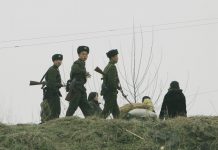[imText1]On the 20th, Human Rights Watch released its 2010 “World Report,” which brings together a review of all the most important issues in the field of international human rights during 2009. As usual, North Korea is a key target for criticism as one of the world’s worst human rights abusers.
Among the most dubious plaudits North Korea receives in this year’s report is that of being one of just three nations, the others being Eritrea and Turkmenistan, which are “so oppressive that no domestic human rights movement can exist openly,” primarily because, “No one dares.”
In addition to such a damning categorization, the list of specific North Korean human rights abuses which the report expresses concern over is long, including long-standing complaints such as the complete absence of political opposition to the Kim Jong Il regime, and a total lack of free media of any kind, a functioning civil society or any kind of religious freedom.
Meanwhile, the preponderance of arbitrary arrest, detention, torture, ill-treatment of detainees and absence of due process in law remain, the report notes diplomatically, “serious issues.”
Collective punishment is standard for “anti-nation” crimes, the report continues, while also noting the existence of public executions for stealing state property (which, in North Korea, means almost everything), hoarding food, and other supposedly “anti-socialist” crimes.
North Korea criminalizes leaving the country without the permission of the state, it goes on, and those who violate the law face “grave punishments upon repatriation such as torture, lengthy terms in horrendous detention facilities, and even execution, depending on what they did and who they met while abroad.”
The report also assails conditions for North Korean refugees in China, meaning those who manage to evade the added, constant risk of arrest and repatriation.
Noting that a large number of North Korean women in China live with Chinese men in “de facto marriages,” the report notes that, irrespective of the length of their stay in China, “they are not entitled to legal residence and remain vulnerable to arrest and repatriation.” Additionally, the report notes evidence that North Korean women and girls are frequently trafficked into forced marriage or prostitution in China.
Finally, continuing to criticize Chinese policy in damning terms, the report notes that “thousands of children in China born to North Korean mothers and Chinese fathers are forced to live without a legal identity or legal access to elementary education,” an action necessary “to avoid their mothers being identified and repatriated,” while “North Korean children who migrate to China have no legal right to obtain household registration papers.” In Chinese law, the report explains, North Korean and half-North Korean children should be admitted to schools without having to submit household registration papers, but “in reality, most schools require such documentation.”
It is worth noting that, among the torrent of rights violations committed by the North, one final criticism leveled at the Korean peninsula in this year’s report actually concerns South Korea as well. The Kaesong Industrial Complex, the centerpiece of South Korea’s economic engagement policies with the North, is a place where, the report states damningly, “the law governing working conditions… falls far short of international standards on freedom of association, the right to collective bargaining, gender discrimination and sexual harassment, and hazardous child labor.”

















